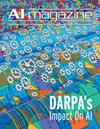预期思维的认知结构理论
IF 2.5
4区 计算机科学
Q3 COMPUTER SCIENCE, ARTIFICIAL INTELLIGENCE
引用次数: 0
摘要
我们的理论是,预期思维(AT)使用与一般认知相同的计算基础设施,如认知的共同模型中所述。我们用事件认知研究的结果对通用模型进行了扩展。利用这些构建块,我们提出了一个在认知架构组件中实现的AT的五步过程模型。然后,我们重新审视我们模型的简化假设,并扩展我们的理论作为回应。最后,我们对AT的描述进行了预测,重点关注自然和人工认知系统中的计算限制如何影响对AT的支持。本文章由计算机程序翻译,如有差异,请以英文原文为准。

A cognitive architecture theory of anticipatory thinking
We theorize that anticipatory thinking (AT) uses the same computational infrastructure as general cognition as described in the Common Model of Cognition. We extend the Common Model with results from research on event cognition. Using these building blocks, we present a five-step process model of AT as realized in cognitive architecture components. We then revisit simplifying assumptions underlying our model and expand our theory in response. Finally, we make predictions that are entailed by our account of AT, focusing on how computational limits in both natural and artificial cognitive systems can impact support for AT.
求助全文
通过发布文献求助,成功后即可免费获取论文全文。
去求助
来源期刊

Ai Magazine
工程技术-计算机:人工智能
CiteScore
3.90
自引率
11.10%
发文量
61
审稿时长
>12 weeks
期刊介绍:
AI Magazine publishes original articles that are reasonably self-contained and aimed at a broad spectrum of the AI community. Technical content should be kept to a minimum. In general, the magazine does not publish articles that have been published elsewhere in whole or in part. The magazine welcomes the contribution of articles on the theory and practice of AI as well as general survey articles, tutorial articles on timely topics, conference or symposia or workshop reports, and timely columns on topics of interest to AI scientists.
 求助内容:
求助内容: 应助结果提醒方式:
应助结果提醒方式:


